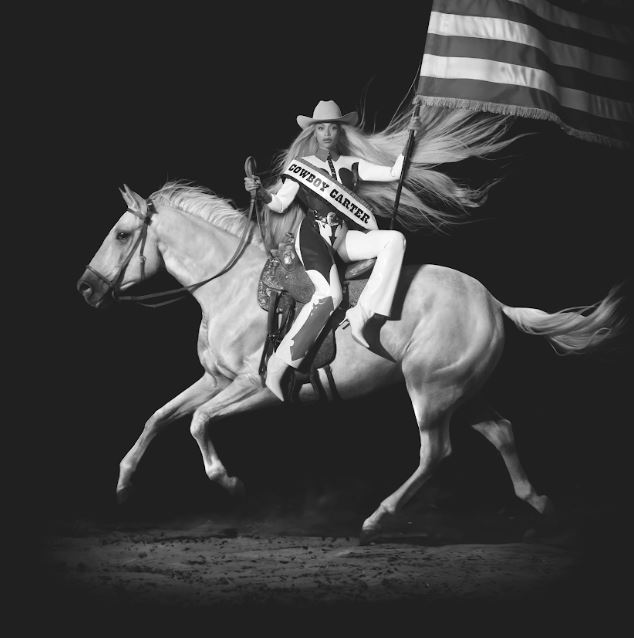Beyoncé’s newest album “Cowboy Carter” opens with nearly 40 seconds of choral notes gracing listeners’ ears before the first strum of the electric guitar sounds. “Ameriican Requiem,” this mix of a hymnal and a twanging mission statement, perhaps best encapsulates “Cowboy Carter” as a project (by the way, the double is in song titles, a motif throughout the album, refer to this album being “Act II” of the project Beyoncé created during the pandemic). The album is a paradox of traditional country aesthetics and subversion of the boundaries of the genre. “Can you hear me? Or do you fear me?” sings Beyoncé atop the whirr of synths two minutes into the album opener. “They used to say I spoke too country, then the rejection came, said I wasn’t country ‘nough,” she continues. “Ameriican Requiem” throws listeners right back to 2016, when Beyoncé’s performance of “Daddy Lessons” at the Country Music Association Awards was met with a racially charged backlash from conservative country fans. More than just the first instance of a genre-defying song in “Cowboy Carter,” “Ameriican Requiem” is the album’s thesis, Beyoncé’s defense of her country bona fides.
However, the album quickly departs from this defensiveness and assertiveness. What follows could be described as the album’s more traditional country/country rock half. Highlights include “Bodyguard,” an upbeat groove comparing Beyoncé’s relationship with her lover to the protection of a bodyguard. “16 Carriages” is a classic ballad about loss and resilience while “Protector” meditates on Beyoncé’s relationship with her children and incorporates the voice of her daughter Rumi Carter.
Also notable in this first half are the covers. “Blackbiird” is quite similar to the 1968 Beatles original, yet particularly highlights the smoothness and gentleness of Beyoncé’s voice. Paul McCartney, the song’s original writer, was inspired by the U.S. Civil Rights Movement, and Beyoncé’s cover features four other contemporary Black country singers: Brittney Spencer, Reyna Roberts, Tanner Adell, and Tiera Kennedy. With these guest showings and separate features from country legend Linda Martell, “Cowboy Carter” bridges between the old and the up-and-coming generations of Black country music.
The second cover is “Jolene,” a reimagining of Dolly Parton’s classic. While the original song begs Jolene not to take Parton’s man, Beyoncé instead warns and threatens her to “find your own man.” While vocally impressive, this rendition comes off as insecure and desperate while failing to find the vulnerability key to the original “Jolene.” It seems as though the scars of Beyoncé’s husband Jay-Z’s cheating, which inspired her 2016 album “Lemonade,” are coming back to the forefront, yet in a less relatable and vulnerable fashion. However, the next song, “Daughter,” gets at this same theme from a more interesting position, comparing Beyoncé’s reaction to the infidelity to the coldness of her father.
Next, with a rattle and a thrum of strings, the album transitions into its more experimental second half. “Spaghettii” is essentially a rap song in rhythm, but still includes country iconography in its lyrics. “Ya Ya,” my personal favorite on the album, is a ’60s rock jam with driving percussion made for “shakin’” and “jerkin’.” “Riiverdance” utilizes Dolly Parton’s technique of acrylic nails as percussion with a thumping kick drum evoking a line dance.
Besides “Ya Ya,” my three other favorite songs come from this half of the album. “II [Two] Most Wanted” is a beautiful guitar-heavy duet with Miley Cyrus, while “Levii’s Jeans” is a sultry love song featuring Post Malone. “Tyrant” has a trap beat built over an energetic violin phrase and is about Beyoncé reclaiming dominance and control in a relationship.
The genre-bending second half of “Cowboy Carter”’s recalls the album’s central paradoxes. It’s a country album that tries not to be bound by its country-ness. It experiments melodically and production-wise, yet several songs resort to somewhat overdone Wild West–esque symbols. Examples of this include the references to poker, whiskey, dive bars, and tornados in “Texas Hold ‘Em,” “shoot[ing] up the bar and tell[ing] the law we don’t remember nothin’ after that” in “Tyrant,” and the direct brand callout in “Levii’s Jeans.” The allusions pulled straight from a Zane Grey novel distract from the album’s musicality. They make it feel bound by its genre stereotypes even as it purports to push beyond them.
Similarly, the overt references to Beyoncé’s (rightful) grudges against the music industry break listeners’ immersion in the world of the album. The statement of her defiance in “Ameriican Requiem” is great at setting an intention for the album, but we don’t also need the line “AOTY [album of the year] I ain’t win,” in “Sweet Honey Buckiin’,” referencing the fact that Beyoncé has the most Grammy wins of all time but has never won the Academy’s top prize. Listeners can hear that “Cowboy Carter” is experimental without an intro telling them “this particular tune stretches across a range of genres,” done in “Ya Ya.” “Cowboy Carter” is a statement in and of itself, and doesn’t need to reference its own significance.
So, the album is at its best when it’s least self-aware. It shines when Beyoncé covers key themes and archetypes of country music — Southern heritage, relationship struggles, and a working-class lifestyle — without being too obvious. The album, musically speaking, shows off its country style masterfully, so it’s a shame that the lyrics occasionally resort to cliché, feeling like they’re compensating for something in the music that doesn’t actually need to be compensated for. To borrow the parlance of an English teacher, Beyoncé already shows listeners her vision; she doesn’t also need to tell them.
Perhaps this tension comes from the album trying to do two mutually exclusive things. It tries hard to prove its “countryness” but also pushes beyond it. It feels notably less cohesive than 2022’s “Renaissance,” its transitions still clean but less natural and its flow interrupted by the genre switches and references to itself.
“This isn’t a country album, this is a Beyoncé album,” declared Beyoncé in an Instagram post before the release of “Cowboy Carter.” The album, despite being a radical sonic departure from much of her previous work, still feels unmistakably Beyoncé. The best moments happen when her purest artistry shines through, unimpeded by overthinking or overdoing.


